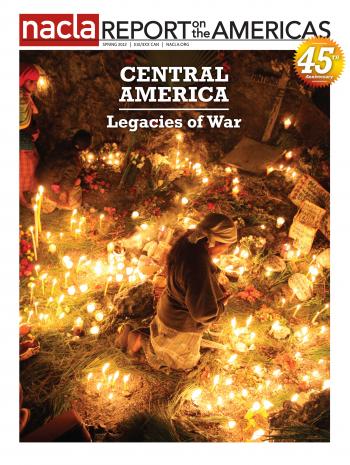Report
WikiLeaks cables reveal U.S. diplomatic distraction, neglect, and half-heartedness in Central America, as the United States is poised to re-engage the region.
Atlee has been doing solidarity work in Central America for more than 30 years. Many actors are the same, only now it’s more complicated—but just as urgent.
Communities that suffered through the civil wars of the 1980s and 1990s are once again faced with violence as they defend their land against international interests.
El Salvador’s 1992 Peace Accords turned the guerrilla group into a political party. In 2009, the FMLN won the presidency. FMLN International Relations Secretary Nidia Díaz speaks to the present and the past.
The June 28, 2009, coup upset the consolidation of democracy and represents a strong return to the past, when the military repressed protest and the exercise of civic rights.
There are two winds blowing in Guatemala today. One is for justice, and the other is the right-wing outrage that swept retired general Otto Pérez Molina to the presidency in November.
Twenty-two years later, the legacy of the U.S. invasion of Panama lives on in profound ways that continue to shape both domestic and foreign policy in Panama.
Nicaragua’s gangs are less a legacy of war and more a consequence of there having been no resolution to the many social, political, and economic issues that led to war and revolution in the first place.
FMLN president Mauricio Funes came to power in 2009 with a pledge to break the hard-line crime-fighting policy of his predecessors. But recent cabinet shake-ups may herald a return to the past.
Chomsky discusses emerging trends in Central America, including the rise in violent crimes and the legacy of U.S. intervention in Latin America.

